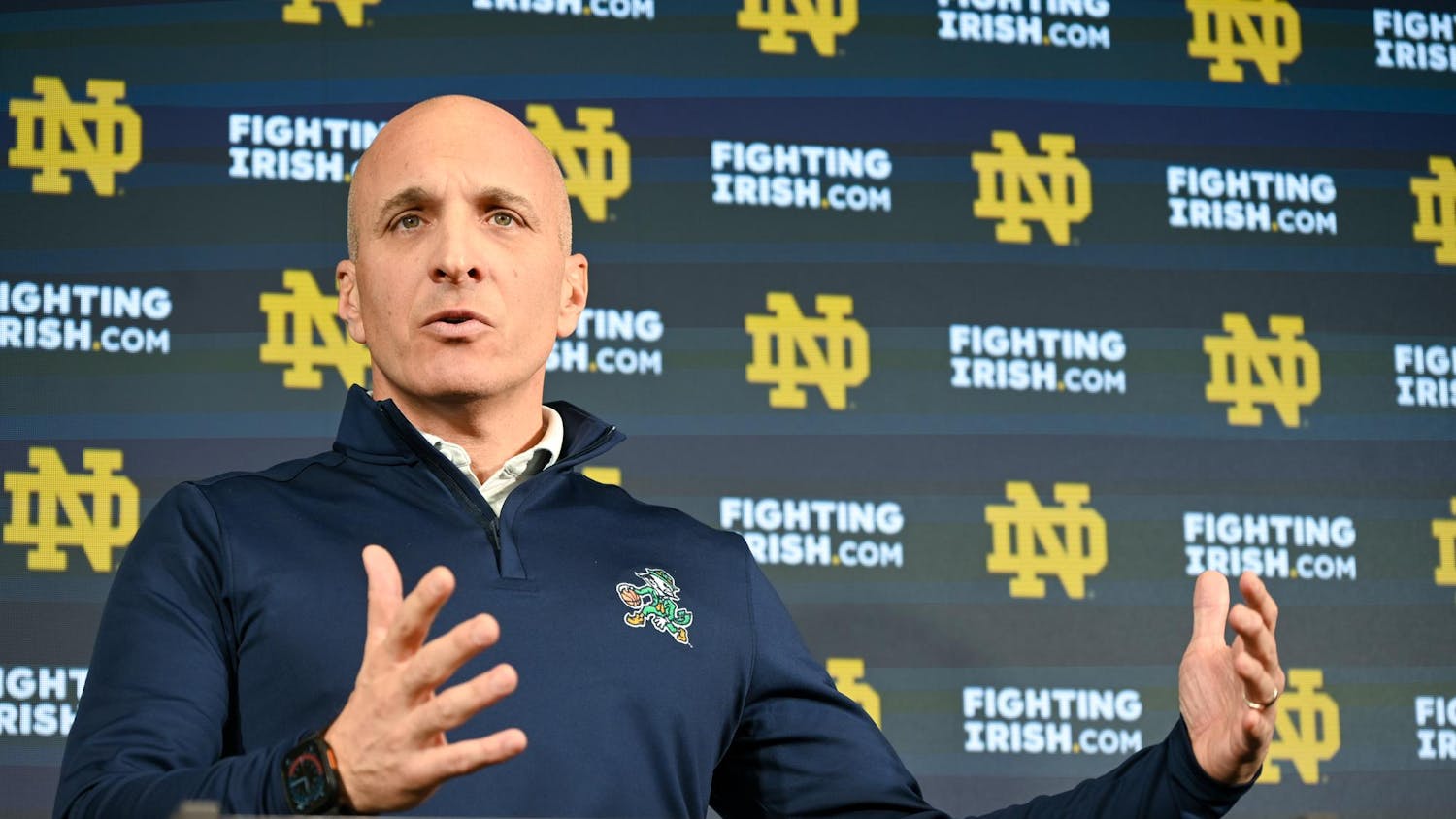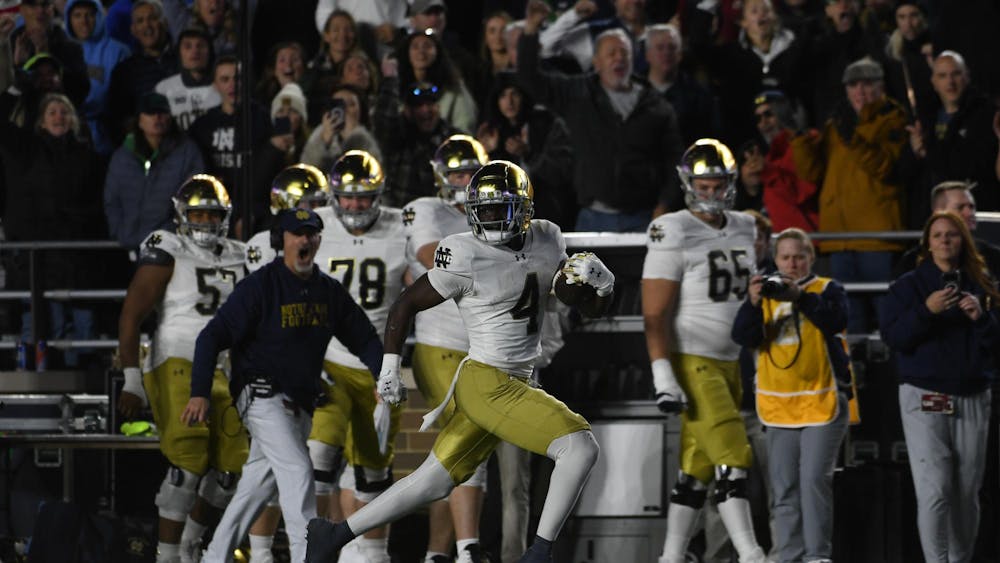Notre Dame alum Paul “The Golden Boy” Hornung — a college football and NFL Hall-of-Famer for whom the Paul Hornung Award, given annually to the best all-around player in college football, is named — passed away Friday due to complications with dementia. He was 84 years old.
A native of Louisville, Ky., Hornung elected to attend Notre Dame over the University of Kentucky, then coached by Bear Bryant. He started his career as a fullback but played a variety of positions, from halfback to quarterback to safety to placekicker. Hornung also had a brief stint playing basketball for the Irish as a sophomore.
Hornung would play three seasons with the Irish on the gridiron from 1954-1956, recording 1,696 career passing yards and 12 touchdowns while also rushing for 1,051 yards and six scores. He also caught three passes as a senior.
For his efforts, Hornung was not only named a First-team All-American as a junior and as a senior, but he also won the Heisman Trophy, given annually to the best player in college football, in his final collegiate year in 1956. He was the fifth Heisman winner in program history.
Hornung won the Heisman despite the Irish going just 2-8 in his senior campaign, and he is the only player to have ever won the award whose team posted a losing record. That year he led the Irish in passing, rushing and scoring as well as in pass breakups, punting, punt return and kickoff return yards. He was second in interceptions and tackles.
Hornung received his business degree from Notre Dame before being selected with No. 1 overall pick in the 1957 NFL Draft by the Green Bay Packers. He would play all nine seasons of his professional career in Green Bay, eight alongside fellow hall-of-famer and fullback Jim Taylor. A possible 10th season with the New Orleans Saints did not come to fruition as a pinched nerve forced Hornung to retire.
During his professional career Hornung received many accolades, including two First-Team All-Pro selections in 1960 and 1961, a Second-Team selection in 1959, two Pro Bowl selections in 1959 and 1960, the NFL Most Valuable Player and Bert Bell awards in 1961, and was a four-time NFL Champion. While he also won the first ever Super Bowl with the Packers in January 1967, Hornung’s pinched nerve prevented him from participating in the contest.
Hornung continued to serve as a halfback and placekicker in the pros. His 176 points in 1960 stood as a single-season record until it was broken by Ladainian Tomlinson in 2006. Hornung accomplished his feat in just a 12-game season, while it took Tomlinson 14 games to surpass the record.
Hornung also set records for the most points scored in a single calendar month in 1965 (77) — a record which was also broken by Tomlinson (78) in 2006 — and the most points in an NFL championship game (19) — a total bested only by James White (20) in Super Bowl LI, 56 years after Hornung set the record in 1961.
The records don’t stop coming for Hornung, who is the all-time NFL leader in games with 30+ points scored (2), games with 25+ points (3) and the most games in a single season with 13+points (8). The only red mark on his record list is that for the most missed field goals in a single season with 26 botched attempts in 1964. He was inducted in the Green Bay Packers Hall of Fame in 1975 as well as the collegiate and NFL Halls of Fame in 1985 and 1986, respectively.
Hornung was also an active duty service member of the U.S. Army in 1961, although he was granted a pass to continue playing for the Packers on Sundays thanks in part to a friendship between Packers head coach Vince Lombardi and U.S. president John F. Kennedy.
After retiring from football, Hornung served as a color commentator for the Minnesota Vikings starting in 1970. He would go on to work telecasts for TVS WFL and CBS NFL, in addition to working ABC USFL radio broadcasts. He also dabbled in collegiate play-by-play in the 1980s, working alongside Taylor for the latter’s alma mater of LSU.
Hornung also played a role in legal battles in the sports world. In the early 1960s, he was the plaintiff in Hornung v. Commissioner, which established that athletes could not subtract athletic awards prizes from their gross income, and in 2016, Hornung was part of a group suing helmet manufacturer Riddell for not doing more to prevent football player head injuries.
Hornung also had his fair share of missteps. In April 1963, he and Detroit Lions defensive tackle Alex Karras were suspended indefinitely from the NFL by commissioner Pete Rozelle after the two were discovered to have been betting on NFL games and associating with undesirable persons. Hornung owned up to the mistake and the two were readmitted to the league in March 1964.
Hornung also credited Lombardi for convincing Rozelle to reinstate him, and in order to make up for his mistake Hornung did not take any further trips to Las Vegas nor did he attend the Kentucky Derby as a player in order to avoid any temptation to gamble.
Further controversy arose when, in 2004, Hornung made a comment about a recent lack of success Notre Dame football had been experiencing. He said that the University needed to loosen its academic standards in order to admit better football players, specifically saying, “We must get the Black athletes if we’re going to compete.”
Hornung faced backlash for that statement, with the University dubbing his comments “generally insensitive and specifically insulting to our past and current African-American student-athletes.” Former Irish head coach Ara Parseghian also criticized Hornung for suggesting the University should lower its academic requirements. Hornung pivoted and said he was not trying to differentiate between races.
The Hornung family will be having a private funeral mass and burial at St. Louis Bertrand Church in Louisville with the burial at Cave Hill Cemetery. In lieu of flowers, the family requests that donations be made to the Norton Sports Health Athletics and Learning Complex via the Louisville Urban League or the Sister Visitor Center via Catholic Charities of Louisville.
Read More
Trending








